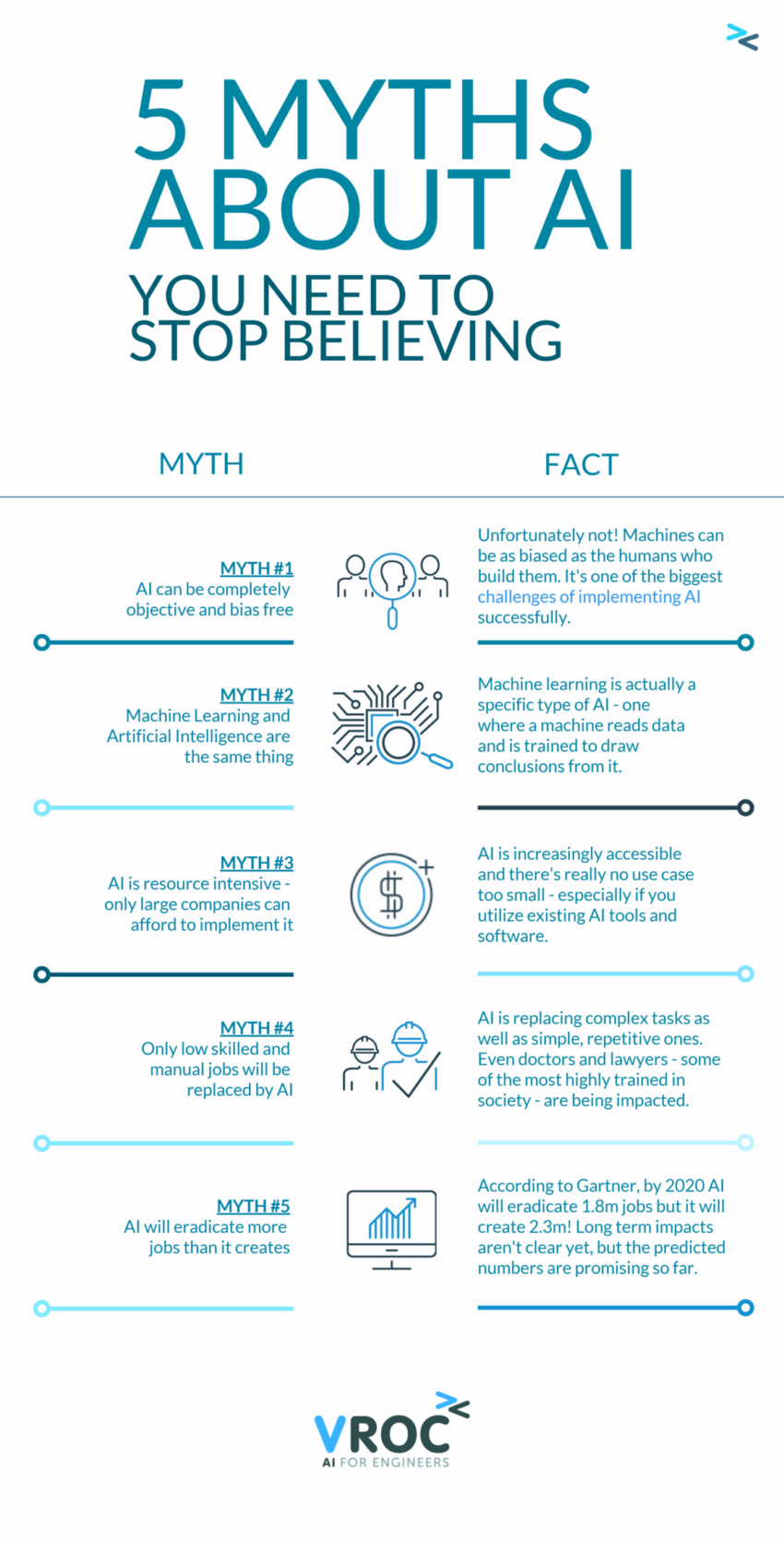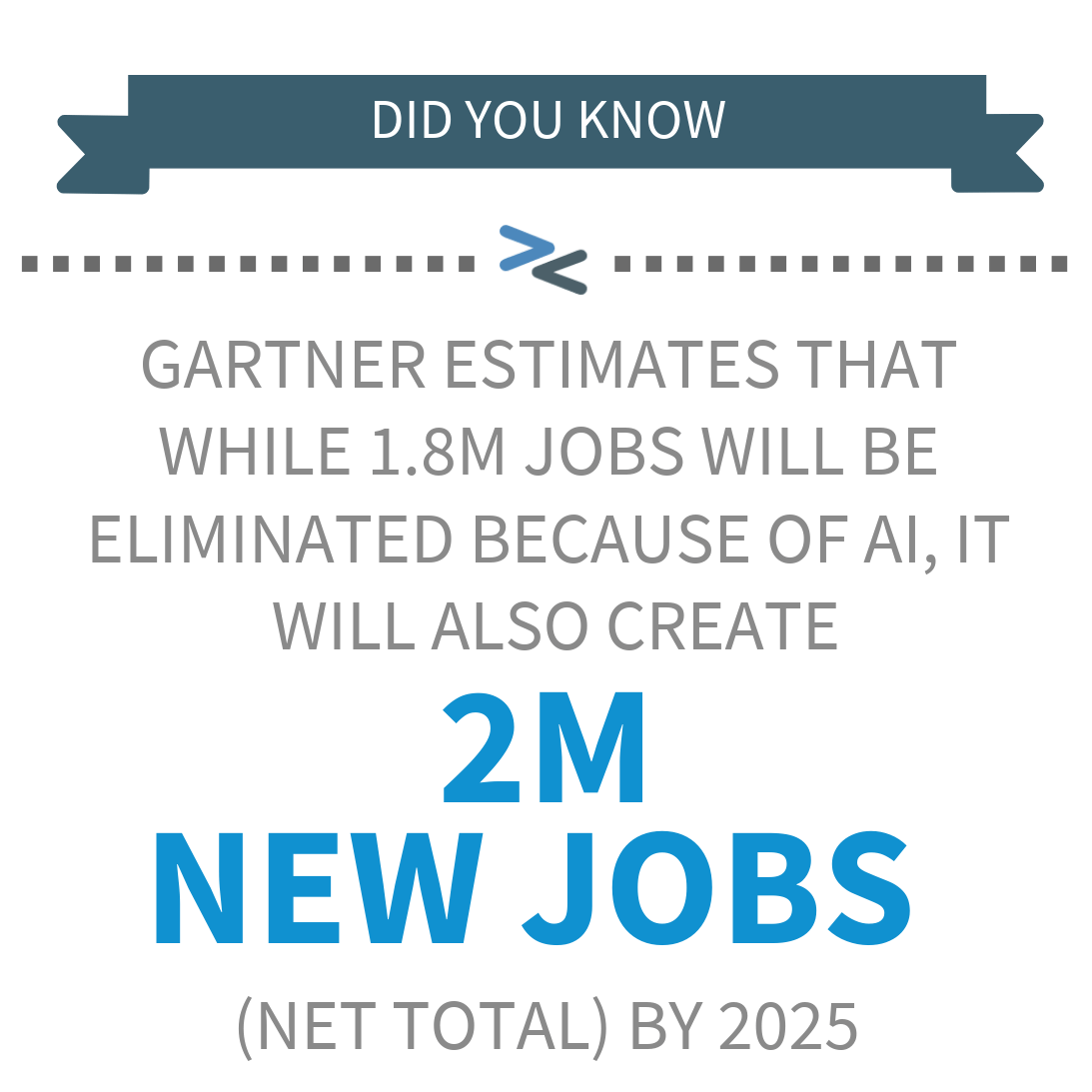You’ve probably heard some of these myths before – in fact you might even believe some of them yourself!
But we’re here to debunk what you think you know about artificial intelligence and set the record straight about what this new breed of technology is really doing in the world.

This is an interesting one because it would make logical sense that a computer would compute without bias. After all, algorithms don't have feelings or opinions. And while that is true, artificial intelligence doesn't exist in a vacuum - it is created, operated and informed by very biased creatures - humans! And humans come with all of those pesky things. In fact this is probably one of the biggest challenges that comes with implementing AI.
Human operators majorly influence the processing and synthesizing power of AI by what values we include (or don't include) and by the direction we code into algorithms about how they should (or shouldn't) make correlations.
So while an AI will never be completely objective, with the right considerations it can get close to being that way.
Sorry folks, but we’re here to tell you they’re actually quite different! Just like machine learning is different to deep-learning and they’re both different again from neural networks. Most of the things just mentioned are actually specific forms of artificial intelligence.
Some definitions are probably useful here. The term ‘artificial intelligence’ can be used broadly to describe machines that mimic “cognitive” functions that humans associate with other human minds, such as “learning” and “problem solving”.
Meanwhile, machine learning is considered a subset of AI – a specific branch whereby machines read data and are trained to draw conclusions from that data – in the form of predictions or decision – without having been explicitly programmed to do so.
This is a common misconception about AI. Because it’s (relatively) new and literally at the cutting edge of current technology, it’s easy to assume it comes with a massive cost to any company interested in integrating it. In actual fact, AI is already surprisingly accessible.
You’ve probably used AI today already to filter your emails or to chat with Siri, Alexa or Google. But what you might not know is that a lot of the tools these massive companies are using available and ready for you to tap into. In fact, Google has an entire website, called Google AI, dedicated to making their AI knowledge and tools open source.
More than that though – implementing AI is easier than most people think. Lots of platforms and programs exist that can be easily overlaid on top of your existing processes and systems that will inform greater understanding of the data you already have.
” .. while AI is being used in industrial settings to model thousands of datasets, it doesn’t remove the need for data scientists – rather it limits and transitions these experts to deal explicitly with outlying and unusual cases. “
While AI will certainly be able to take on many repetitive and monotonous tasks and automate them more efficiently and effectively, these aren't the only type of jobs that will be affected.
AI has the potential - and in some case is already being used - to augment more complex tasks that people in highly skilled professions would typically do.
For example, those in the highly trained profession of medicine are now using AI to review and detect abnormalities on chest X-rays.
In industrial settings, algorithms are being used instead of data scientists to model thousands of different reasons that equipment has (or might) fail. This analysis and prediction power doesn't eliminate the need for data scientists and skilled experts though. Rather, it limits and also transitions these experts to dealing with bespoke and unusual cases.
According to a study by Gartner, AI will actually have a net positive impact on job creation.
While it is expected to eliminate 1.8m jobs, it's also expected to result in 2m net-new jobs by 2025, thanks to AI-related job creation.
While these are some pretty big numbers, it will certainly be interesting to see how this plays out once 2025 rolls around in what will no doubt be a short five years!
There's still a lot of misinformation out in the world about AI but hopefully these 5 busted myths will help you go about your business more informed about the impacts and affects of AI into the future.
If you're interested to find out more about the potential challenges of implementing AI into your business you can download our whitepaper, Exploring the Challenges of Implementing AI today.

Why data quality, silos, delays and dark data could be stalling your digital transformation
Read ArticleEmpowering decision making and operational efficiency with AI on an offshore platform in Central Asia.
Read ArticleInterested in a demo of one of our data solution products?
DataHUB4.0 is our enterprise data historian solution, OPUS is our Auto AI platform and OASIS is our remote control solution for Smart Cities and Facilities.
Book your demo with our team today!
Ready to embark on a pilot project or roll-out AI innovation enterprise wide? Perhaps you need assistance integrating your systems or storing your big data? Whatever the situation, we are ready to help you on your digital transformation.
The efficient deployment, continuous retraining of models with live data and monitoring of model accuracy falls under the categorisation called MLOps. As businesses have hundreds and even.
Learn more about DataHUB+, VROC's enterprise data historian and visualization platform. Complete the form to download the product sheet.
Discover how you can connect disparate systems and smart innovations in one platform, and remotely control your smart facility. Complete the form to download the product sheet.
'OPUS, an artistic work, especially on a large scale'
Please complete the form to download the OPUS Product Sheet, and discover how you can scale Auto AI today.
Interested in reading the technical case studies? Complete the form and our team will be in touch with you.
Subscribe to our newsletter for quarterly VROC updates and industry news.